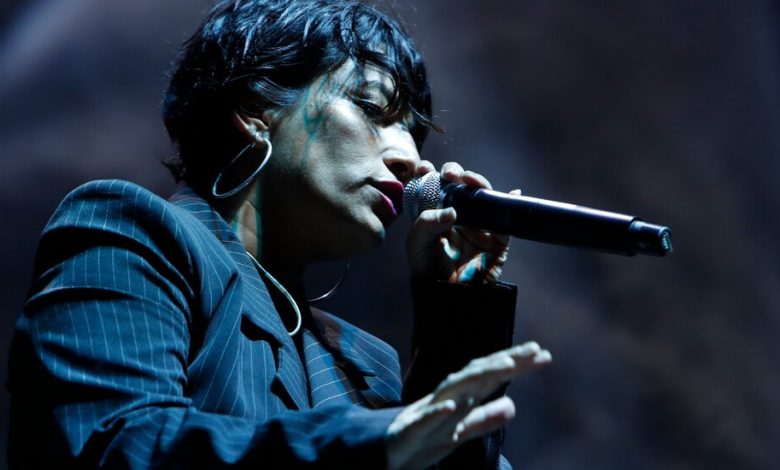Ana Tijoux’s First Album in a Decade Fights Sorrows With Joy

The finale of “Vida,” the new album by the Chilean songwriter Ana Tijoux, is “Fin del Mundo” (“The End of the World”). She sings and raps, in Spanish, about dire expectations: war, pollution, drought, a collision with a comet. But as a techno-tinged disco beat rises around her, she cheerfully declares, “If the end of the world is coming, let’s dance naked together.”
“Vida” (“Life”) is Tijoux’s fifth studio album and her first since 2014. She chose its title pointedly.
“I have a very good friend who talks to me about how life is the best vengeance against death,” she said in a video interview from her apartment in Barcelona, where she relocated during the pandemic and recorded the album. “That makes so much sense, to have vitality and energy. I insist that it doesn’t mean that we live in a superficial place. It doesn’t mean that it’s not political. We are living in a bizarre moment. And there is nothing more political than defending life and defending humanity.”
In the album’s first single, “Niñx” (“Little Girlx”), Tijoux urges her daughter, and all young women, to find strength in joy: “Life scares them,” she sings. “Do not lose the laughter.”
Tijoux, 46, found an international audience with her second solo album, “1977,” which was released in 2010. It was named after the year she was born, in France, to Chilean parents who had gone into exile during the dictatorship of Augusto Pinochet. Living in Paris, Tijoux was drawn to the hip-hop she heard while visiting immigrant families from Africa with her mother, a social worker; she, too, felt like an outsider.
“Even if I couldn’t understand the lyrics,” she said, “that kind of music, that culture, changed our life.”
On “Vida,” Tijoux salutes 50 years of hip-hop in “Tú Sae’” (“Y’know”), joined by Plug 1 from De La Soul and Talib Kweli, who observes, “The root of community is unity.”
Soon after the Pinochet regime ended in 1990, Tijoux returned to Chile with her parents. In the late 1990s, she established herself as a performer, rapping with the Chilean hip-hop group Makiza before going solo.
The single “1977” multiplied her audience worldwide. It’s a quick-tongued, matter-of-factly autobiographical rap, backed by a vintage-sounding bolero, about growing up and finding her voice in hip-hop; it has been streamed tens of millions of times. In the United States, it was boosted by prominent placement in a 2011 episode of “Breaking Bad.”
On “1977” and the albums that followed, Tijoux glided easily between rapping and singing. With her 2011 album, “La Bala” (“The Bullet”), she began collaborating with the producer and multi-instrumentalist Andrés Celis. He helped broaden her music across eras and regions, drawing on R&B, reggae, rock, electronica and multiple folk traditions along with far-reaching hip-hop samples.
“We’re not super experts on any style of music,” Celis said in a video interview from his studio in Santiago, Chile. “So we’re used to blending everything in a genuine, almost naïve way.”
They build all of her songs together. “She’s a very intuitive artist,” Celis said. “The style of working that we have is like, I bring something very simple — some chords, maybe a little melody, sometimes a bass line, whatever goes with the vibe, you know? And then she’ll say, ‘Yes, that’s what we have to talk about.’”
Tijoux has often written about politics, feminism, resistance, solidarity and the predations of capitalism: songs like “Somos Sur” (“We Are the South”), a modal stomp about the silencing, strength and fearlessness of Africa and Latin America, which features the Palestinian rapper Shadia Mansour; and “Antipatriarca” (“Anti-Patriarch”), a feminist manifesto set to Andean flutes, guitars and drums.
But after the release of her 2014 album, “Vengo,” Tijoux’s songwriting slowed. While she continued touring, she was also raising two children — Luciano, now 18, and Emiliana, 10 — and working on assorted collaborations. One was “Lightning Over Mexico” with Rage Against the Machine’s Tom Morello and the Bloody Beetroots, which had Tijoux rapping angrily about murdered Mexican student activists. Another was “Almacén de Datos” (“Data Warehouse”), a reggaeton song with the Argentine songwriter Sara Hebe that pushes back on treating music as a commodity in the attention economy: “For a businessman, everything is a market,” Tijoux taunts.
Between albums, events spurred Tijoux to write singles. They included “Pa’ Qué” (“Why”), a brisk salsa song, with the Puerto Rican rapper PJ Sin Suela, that mocked politicians downplaying Covid-19; “Rebelión de Octubre” (“October Rebellion”), a ballad that crescendos into an anthem praising protests in Chile and worldwide; and the hard-nosed rap “Antifa Dance.”
In a statement with “Antifa Dance,” Tijoux wrote: “In the face of authoritarianism, imposition, discrimination, the implacable hatred of the other, we return to the word Art with all its force. That art onslaught with music, colors, that art that dances in response, as an organized movement of beautiful rebellion.”
Some of the songs on “Vida” directly extend Tijoux’s sociopolitical concerns. “Oyeme” (“Hear Me”) is a stark, percussive rap and chanted melody that Tijoux wrote after seeing reports that Britain was housing migrant asylum seekers on a barge. “I always have news on in the morning,” Tijoux said. “And it was terrible and absurd once again. I was thinking about the parallel between that and the slave ships.”
Another song, the somber “Busco Mi Nombre” (“I Search for My Name”), is about people who were arrested and “disappeared” by dictatorships in Argentina and Chile; it’s prefaced by spoken words from the grandmother of one Argentine victim. Tijoux wrote and sings it with iLe, the Puerto Rican songwriter who got her start with the activist hip-hop group Calle 13. They met more than a decade ago, sharing the stage at a concert in Brooklyn.
“Years ago there weren’t so many female political figures,” iLe said via video from Puerto Rico. “It’s a difficult challenge to speak through songs, about things that you might be afraid to say. And it’s nice to feel that there are women who are transcending their own fears and just writing and making songs about what they feel they need to talk about. It’s risky, but it comes from an honest place. And I think Ana has done that from the beginning.”
Much of “Vida” is purposefully upbeat — recognizing struggles and losses but looking beyond them. Tijoux wrote “Tania” in memory of her sister, who died of cancer in 2019; it starts as an elegy but turns into a celebration. “She was super funny, she had a lot of vitality,” Tijoux said. “So to make just a sad song would not be fair.”
And in “Bailando Sola Aquí” (“Dancing Alone Here”), an Afrobeats track topped with Latin percussion, Tijoux sings, “I’m tired of this sadness, crying a river for you,” then declares, “I decided to be happy.”
The album is filled with dance beats: funk, trap, cumbia, disco. “I’m a terrible dancer, but I love to dance,” Tijoux said with a smile. “I think the terrible dancers are the best dancers because everyone’s laughing at us on the dance floor. Professional dancers are not funny — you need a bad dancer to make the party interesting.
“We can dance and fight at the same time,” she added. “They’re not opposites.”




